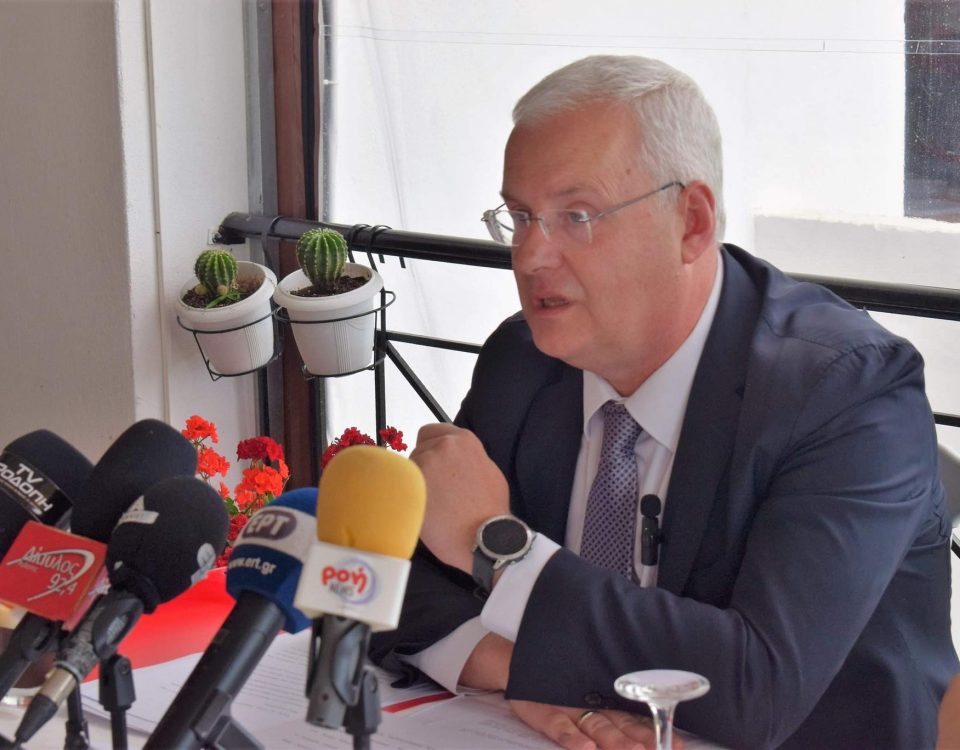- Παρασκευή, 29 Νοεμβρίου
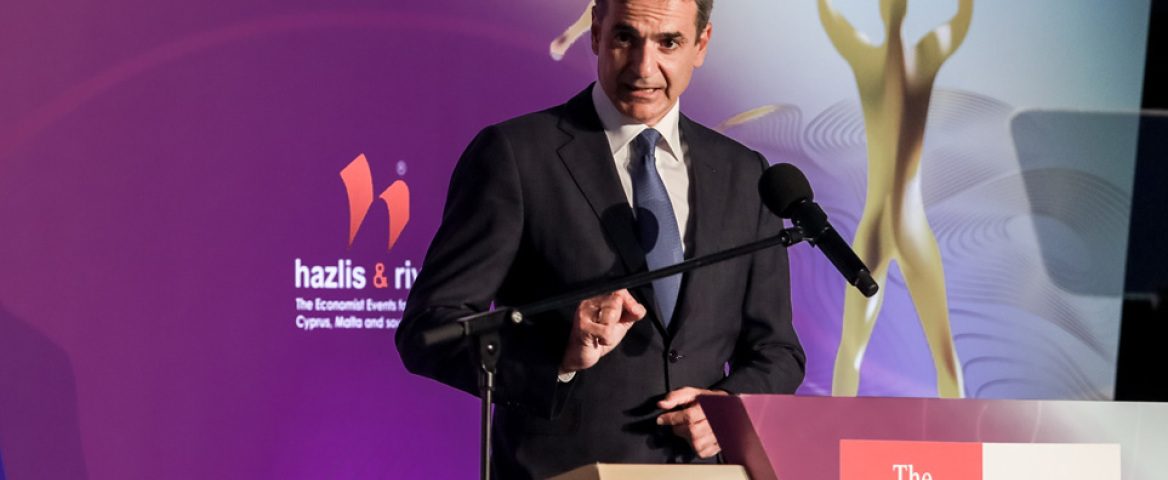
EIU The Economist: Η Ελλάδα στις 20 καλύτερες Δημοκρατίες του κόσμου
Η Ελλάδα βρίσκεται στις 20 καλύτερες Δημοκρατίες του κόσμου σύμφωνα με το «Intelligence Unit» του περιοδικού «Economist» με συνολική βαθμολογία 8,14 στα 10. Πρόκειται για την ετήσια έκθεση «Δείκτης Δημοκρατίας» η οποία εξετάζει την λειτουργία του πολιτεύματος σε συνολικά 167 χώρες.
Όπως χαρακτηριστικά γράφει η έκθεση, « η γενέτειρα της δημοκρατίας έχει λόγους να πανηγυρίζει, αφού επέστρεψε στην «πλήρη δημοκρατία» στην κατάταξη του «Δείκτη Δημοκρατίας» του 2023.»
Παράλληλα τονίζεται πως η Ελλάδα βαθμολογήθηκε με δέκα στα δέκα για τις εκλογικές διαδικασίες και τον πλουραλισμό κατά την διάρκεια των τελευταίων εκλογικών αναμετρήσεων που διεξήχθησαν στην χώρα. Επίτευγμα που όπως υπογραμμίζει η έκθεση «έχουν πετύχει δώδεκα ακόμη χώρες».
«Παρά τις ελλείψεις σε αρκετούς τομείς, συμπεριλαμβανομένης της ελευθερίας των μέσων ενημέρωσης, η Ελλάδα έχει σταθερή βαθμολογία στην κατάταξη για τις πολιτικές ελευθερίες με σκορ 8,82. Γι΄ αυτό και η βαθμολογία της βελτιώθηκε το 2022», σημειώνεται στην έκθεση. Τονίζεται επίσης, πως και ο δείκτης πολιτικής συμμετοχής βελτιώθηκε το 2023 «ένα έτος που στην Ελλάδα πραγματοποιήθηκαν δύο βουλευτικές εκλογές, περιφερειακές και δημοτικές» όπως γράφει η έκθεση.
Ακολουθεί το πλήρες κείμενο:
Where democracy is most at risk
Four lessons from EIU’s new ranking of democracies
Feb 14th 2024
IN THEORY THIS year should be a triumphant one for democracy. More people are expected to vote in national elections in 2024 than ever before. But many elections will be problematic. This year’s democracy index published by EIU, our sister company, shows that only 43 of the more than 70 elections are expected to be fully free and fair.
Each year EIU grades 167 countries and territories on a scale of ten according to the strength of their democratic practices, including how fairly they run elections and how well they protect civil liberties. It then groups them into four categories: full democracies, flawed democracies, hybrid regimes and authoritarian regimes. The latest report, published on February 15th, shows that less than 8% of the world’s population live in full democracies, and that 39.4% are under authoritarian rule—up from 36.9% in 2022. Below are four lessons from the report, including what the index reveals about forthcoming elections.
We start with country-level data. Norway remains the most democratic country, a position it has occupied for 14 years. (All five of the Nordic countries are among the top ten.) Afghanistan is at the bottom for a third consecutive year. The Taliban, unsurprisingly, score close to zero in most of EIU’s measures of democratic health.
No country improved by more than half a point. But EIU promoted Greece, The Economist’s country of the year in 2023, to its full-democracy category after successful parliamentary, regional and political-party elections last year. The biggest decliners were Gabon and Niger, which both experienced coups in 2023.
Our next chart zooms out to regions. Western Europe remains the most democratic place on Earth: 71% of western European countries included in the index are full democracies. Only Turkey is a hybrid regime. (EIU counts it as part of western Europe because it belongs to the UN’s Group of Western European and Other States.)
The scores for every other region declined. The average score for sub-Saharan Africa dropped to its lowest since the index began in 2006. Latin America fell by the most, and recorded its eighth consecutive drop. El Salvador, where Nayib Bukele ran for re-election as president in defiance of the constitution (and easily won earlier this month), was the worst performer in the region.
Our third chart shows the global trend. The average score of 5.23 for 2023 is the lowest since the index began. The decline started in 2016 and was made worse by the curtailment of civil liberties during the pandemic.
In 2023 war and conflict further undermined global democracy. The war in Ukraine is weakening its already fragile democratic institutions (though it remains far more democratic than Russia, the country that invaded it in 2022). Azerbaijan’s conquest of Nagorno-Karabakh, a separatist ethnic-Armenian enclave, in September damaged both its own score and that of Armenia. The civil war in Sudan and Israel’s war with Hamas both threaten security and democracy in the region.
What does all this mean for this year’s elections? In the most democratic countries, such as Iceland and Britain, voters will get to choose their next governments. In Russia, one of the least democratic countries holding elections this year, the only question is whether the results will be as visibly fraudulent as they were in 2021. In countries classed as flawed democracies, such as India and America, elections are still expected to be free and fair, though by other criteria in the index, such as political culture and governance, these places still have weaknesses.
More than half the world’s people live in countries that are holding elections this year. But EIU’s index shows that in democracy, quality trumps quantity.
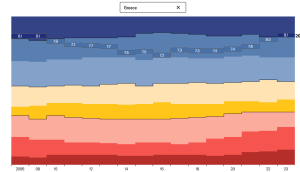
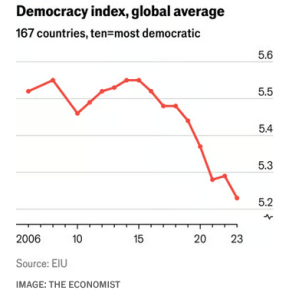
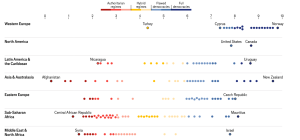
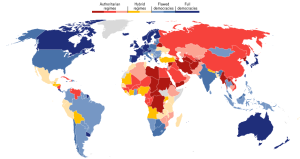
ΠΗΓΗ: EIU The Economist, ΑΠΕ-ΜΠΕ, komotinipress
